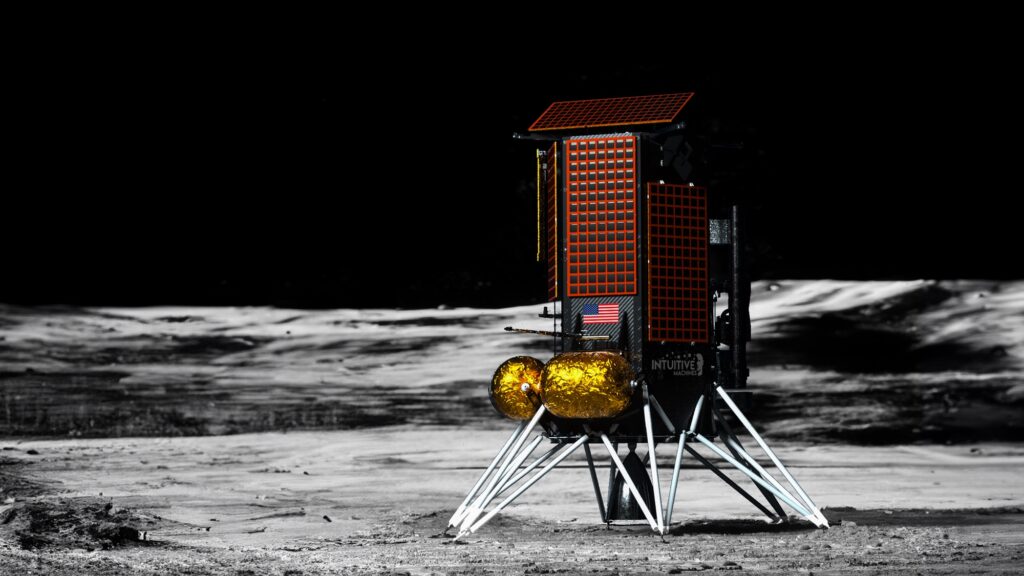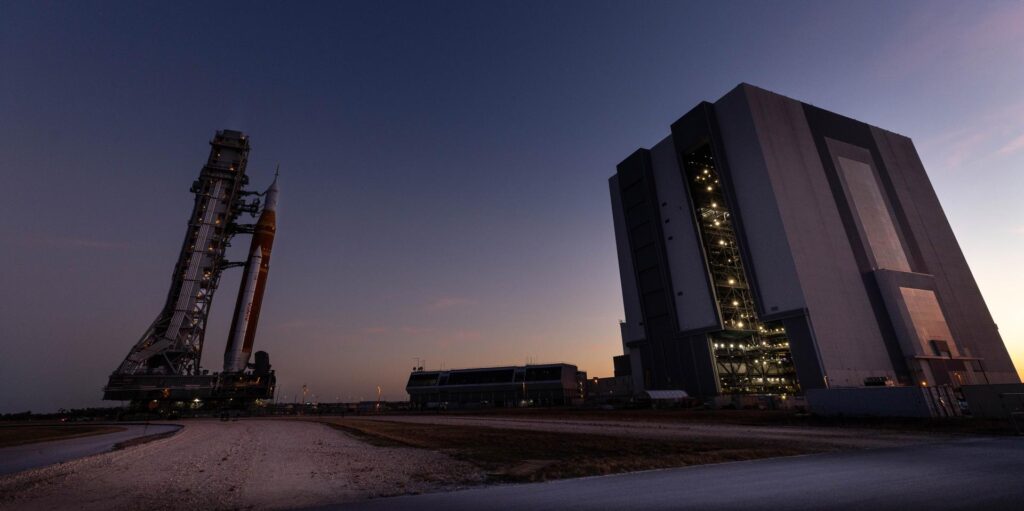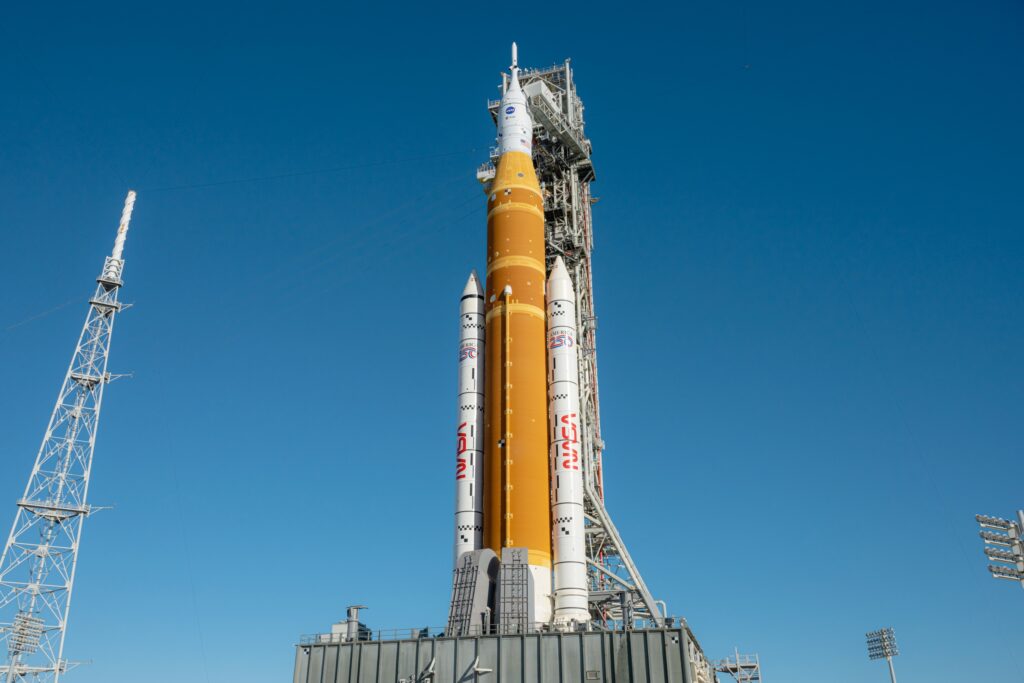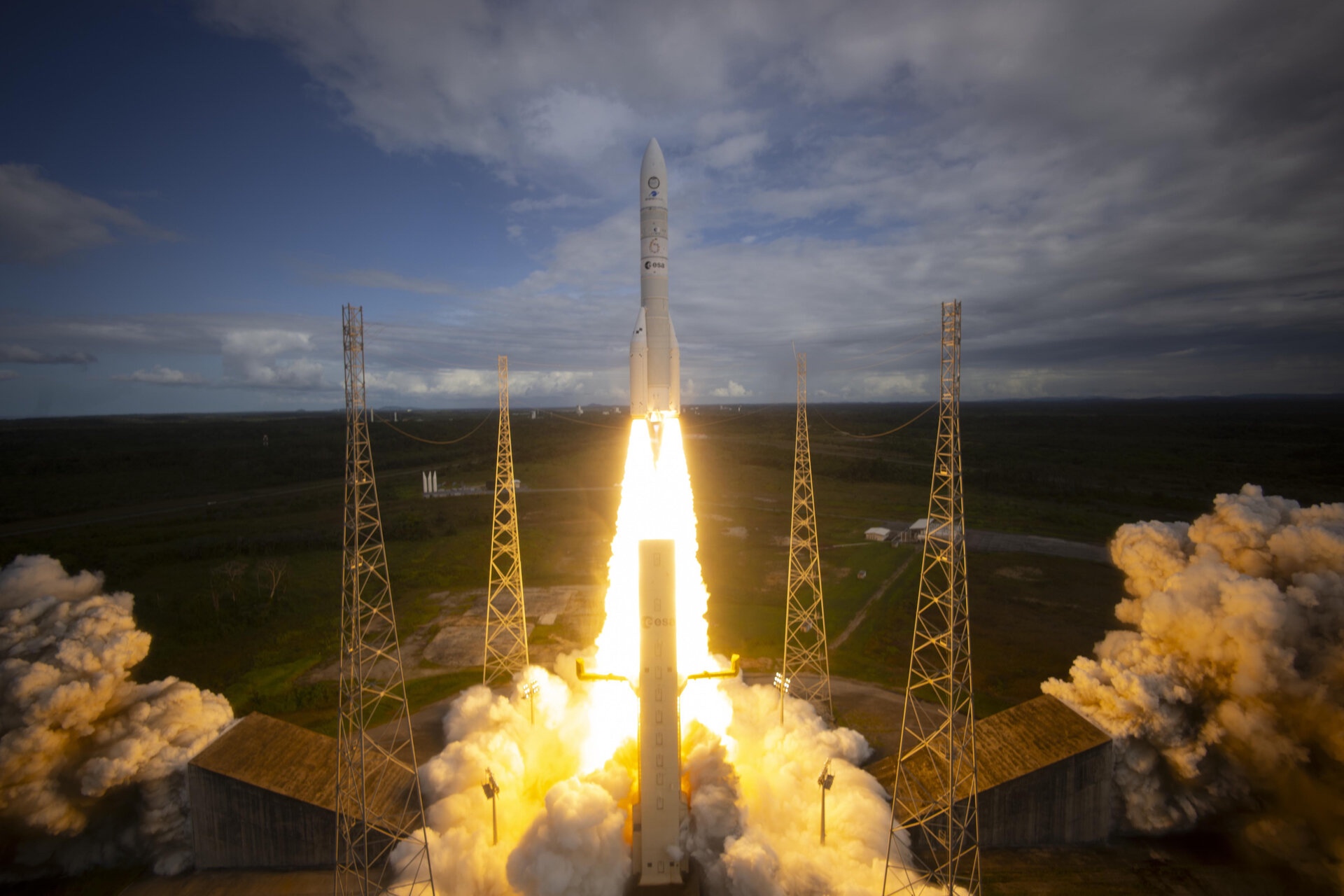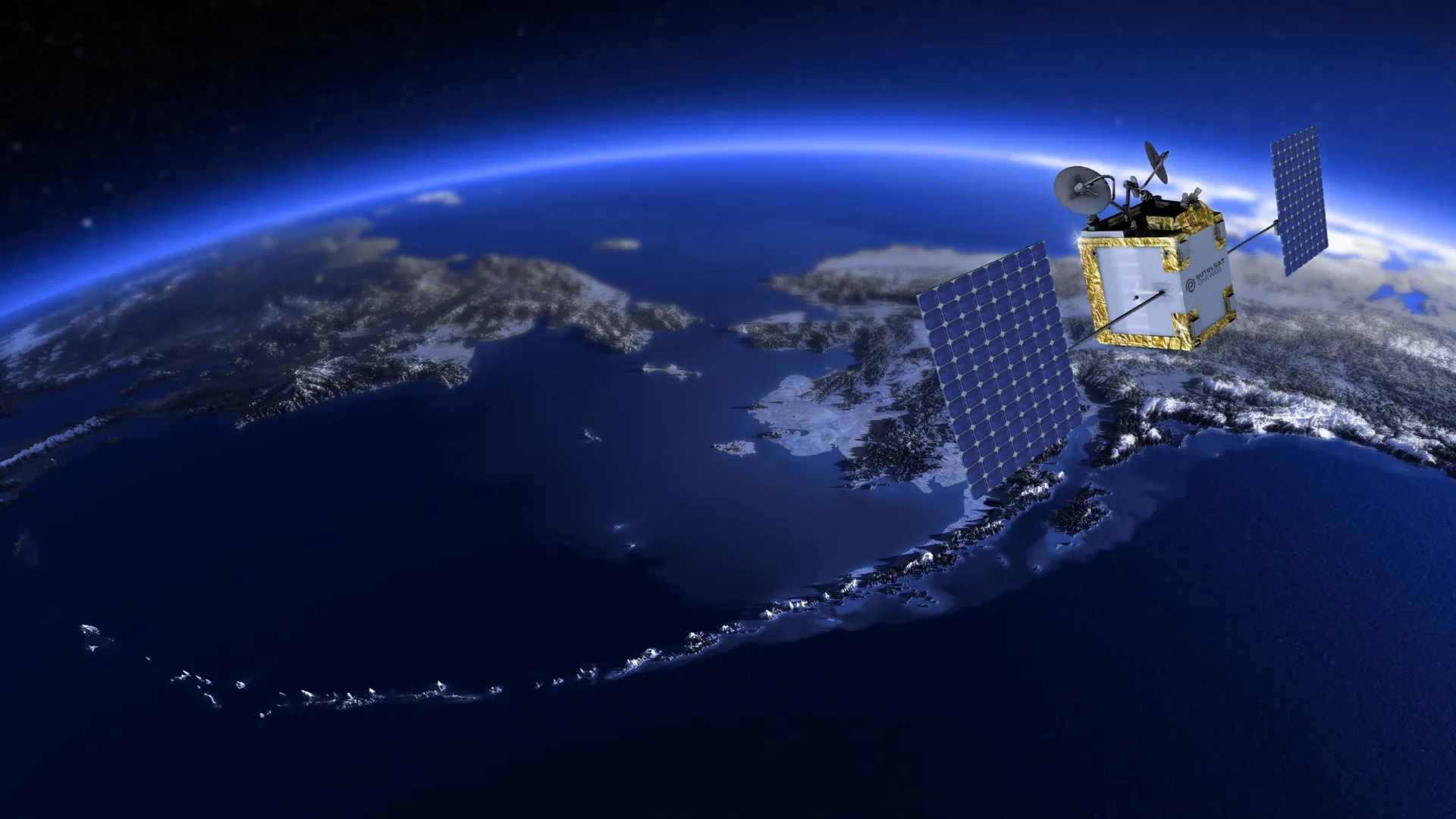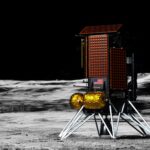Now Reading: What if science fiction is our best glimpse of the future?
-
01
What if science fiction is our best glimpse of the future?
What if science fiction is our best glimpse of the future?
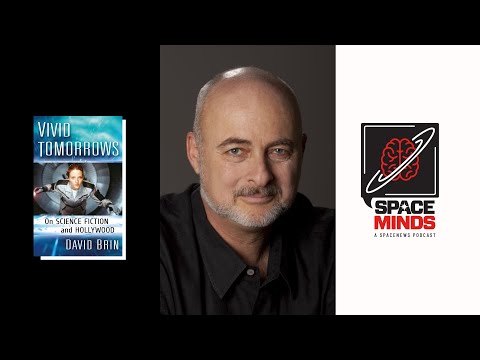
In this week’s episode of Space Minds, award-winning science fiction author and physicist David Brin joins host David Ariosto for a wide-ranging conversation on the future of space, science, and humanity.
From self-replicating probes and quantum sensing to moving Earth’s orbit and the true role of science fiction, Brin offers bold ideas grounded in decades of speculative thought and hard science. He challenges conventional wisdom on the Artemis program, discusses the risks and promises of artificial intelligence, and even makes the case for Yoda as history’s most evil character. Strap in — this is not your average sci-fi chat.
Show notes and transcript
Click here for Notes and Transcript
Time Markers
00:00 – Episode introduction
00:16 – Welcome David Brin
00:44 – SciFi writers informing & guiding
03:32 – Science Fictions role
09:01 – Advances in technology
14:48 – Moving the Earth
20:37 – The big question
24:00 – Humanity, machines and Merging
29:48 – Politics, Artemis and science
33:28 – Vivid Tomorrow’s
36:11 – New book – For our Newest Children
Transcript – David Brin Conversation
David Ariosto – Thanks. David Brin, it is my absolute pleasure to have you on the show. Thanks. Thanks so much for joining us.
David Brin – Well, thank you, David, and Thanks Marc off screen. If my voice is not up to par, it’s because I have a cold, and I’ve been breathing a lot of dust in a home repair situation, but I’ll try to convey ideas. They’re more important than tonality.
David Ariosto – I appreciate you soldiering through this, but let’s jump right into this. So you have a PhD in space physics, you’ve been a consultant in NASA and other organizations, but you’re probably best known as this highly decorated science fiction novelist who really delves into the future. And so I’d like to sort of begin there in the sense that your place, as least as I see it and others have commented, is kind of in this long history of sci fi writers that are informing and guiding, guiding our science and technology, and perhaps even some of the policy behind it. I’m thinking of some of these legendary folks like Arthur C Clarke and Isaac Asimov and Jules Verne and HG Wells, and you know, a lot of the greats. And I wonder, why do you think that is?
David Brin – I’m old enough that I know I knew some of those fellows. Ray Bradbury was a dear friend of mine. I knew Asimov. After he died, his widow asked Greg bear and Greg Benford me to write the second Foundation trilogy, and I wrote the third one, they’re more separated books, but my book Foundation, triumph, tried very hard to tie up all the loose ends that Isaac left when he died, and his widow and daughter thought I did a good job. I worked on all the all the things that had been left dangling, but, yeah, part of the long continuum, and I try to, right now, help younger authors. I’m paying forward by nurturing younger authors in a couple of YA series, young adult series, one of them, in one of them, aliens kidnap a California high school and live to regret it, and in another one, kids from all over time, Joan of Arc, Kim Dae Jung, who would later become the founder of Korean democracy, Arthur Conan Doyle, they all travel to the future to help a future that’s in peril. But here’s the thing, only teenagers can travel through time and space. So if you want a problem solved, you snatch a 14 year old Arthur Conan Doyle who hasn’t done squat yet, right? Yank him into the future. So the beginnings of the logic are there, but he’s not. He’s not Sherlock Holmes yet.
David Ariosto – Well, I think in that context, you know, because it it, there’s a difference right between, sort of, some of the science fiction literature and fantasy, which you know, you tend to focus more on the former. But you know, in1989 you wrote Earth, which you know, it kind of effectively alluded, not kind of, but effectively alluded to this, this notion of gravity maps. And you know, only now are we really beginning to see, sort of the beginnings of, like the practical applications of that in terms of quantum sensing. And, you know, the different senses of different portions of gravity across across the planet. You know, 2012 in Existence you delved into the Fermi paradox, which you know, for those who don’t know, is sort of this contradiction between the high probability of extraterrestrial civilizations and the lack of evidence of their existence. And you know it, I guess my point is, you touch on all these topics somewhat obliquely and sometimes explicitly, that in ways, just seem ahead of their time, and sometimes decades so. And I see that with the Arthur C Clark’s and HG Wells and others, and it’s it’s just an interesting kind of like carve out of how we interact as a species relative to the portions of science that we devote to these things, and maybe that’s where we extrapolate in terms of what could be.
David Brin – Well, I believe that science fiction plays an important role. It doesn’t always, because of 90% of anything is crap, so 90% of science fiction is crap. But. Um, when science fiction does take its role with some degree of seriousness, we’re like the prefrontal lobes on the above the eyes that I call them, the lamps on the brow. We need to understand evolution that we still have the reptilian brain and back we layered onto it a new brain, the mammalian cortex, and layered onto that the primate cortex. And the latest layering is the prefrontal cortex, and this is the portion that lets us do what Einstein called the Gedanken experiment, the thought experiment about, what if, what if I were to wear these clothes for the meeting today? What if I were to propose this at the meeting today? What if I try to run this yellow light? Males have to use the editing cortex, portions of this cortex, to answer, what if all the time with no, no, no, no, you’re not going to do that. No, you’re not going to do that. And but we as humans in general, we have to do that all the time. In any event, the what if question is the heart and soul of real science fiction. I go back to John Brunner, who’s one year, I don’t know, Mirabilis in 1968 stunned us all with the sheep, look up stand on Zanzibar and the shockwave rider, three books that if your viewers go off and read anything in the next year, they should do those. Not me. My novel, Earth is was inspired by stand on Zanzibar, the style and the motif of having many, many character threads all weaving in and out of each other. It’s it’s about our planet, but it’s all about and it’s also about intelligence. It’s about sapience. And, of course, yes, there’s physics, and the resulting gravity laser is extremely speculative, and I’m pleased that some of the Nobel Prize winning physicists I know because I’m just a journeyman physicist. I’m a Franciscan. I have my PhD, but and I can comment on physics pretty well out of good physics instincts. But you know, Roger Penrose, I’m privileged to know as friends. I knew Freeman, Dyson, Richard Feynman stole my data to dance at Caltech. I’m not going to operate in their leagues whatsoever, but I can sort of understand enough to ask them questions. And a couple of them said, well, it your gravity laser isn’t disallowed. That’s all I wanted. That’s all I wanted. The same was true with my first novel, Sundiver, the refrigerator laser, which enabled the sun shift, to go into the atmosphere of the sun and go around and have adventures and a murder mystery and all the things driving the plot. The the cooling system that I devised, um, how does alpha? And said, Well, I don’t see any reason why that wouldn’t work, right?
David Ariosto – I guess part of the reason I say this is like when you talk about gravity lasers, we’re already seeing some experiments in terms of quantum sensing on ISS we talked to, you know, I’ve talked to individuals in Colorado and elsewhere who are looking at commercial applications of these things that you know this, this was decades ago that you’re talking about. And then Existence, which I don’t know if you can see, is on the shelf behind me here, this concept, and I want to get into some of the specifics now. So this concept of self replicating probes and and their potential implications in terms of, you know, scouring our galaxy in search for extraterrestrial life, or just search of just a better understanding and mapping of our galaxy, which is like only now kind of coming in to into a better understanding. I’ve heard it described as almost sort of a new Copernican reckoning that is made possible by some of these new advanced technologies, not least of which James well, but also the influence of AI. But you know, these are conversations that I’ve had with folks like Pete Worden at breakthrough that you know are trying to figure out ways to send probes in an interstellar fashion to places like prox. Centauri. So, like the notion of these, these sort of seemingly far flung concepts there, I mean, they manifest later on. And that, I think is so fascinating in the sense, like you almost you want to know where science is going. Sometimes science fiction is a good way to kind of get a little advanced reader?
David Brin – Well, if you get the right science fiction, the the self replicating probes, they were discussed by Bracewell and by John von Neumann, the Great cyberneticist. And it’s the notion that you you send a probe to another solar system. It does its science. It reports back. And in my work at NIAC NASA’s innovative and advanced concepts program, I just retired from 12 years on their advisory council, we’ve we’ve touched on some of these methods and technologies that we’re just just now talking about, for instance, a way to dive past the Sun Sun diver, which would give the probe far more acceleration if it suddenly shoots open a vast solar sail As it’s passing skimming the solar surface. This would enable the the probe to accelerate out of the solar system faster than anything else. And then you apply the lasers to the scale, and you can really accelerate these things out of the solar system pretty darn fast. But we’re still in very primitive days. We’re talking about probes, you know, might be the size of sugar cube, but…
David Ariosto – Advance of sort of the nanotechnology revolutions that we’re seeing, like what you can pack into that sugar cube is far more than anything we’ve ever seen before.
David Brin – Yes, yes. And so we’re our ambitions are good, and if we solve our political situations, and especially our situation regarding crises of confidence, where it’s absolutely insane that as that a civilization that has so many reasons to be confident is having a crisis of confidence, I think It’s being manipulated intentionally. But the point is that that if you send such a probe, even if it you can patch, pack intelligence into a sugar cube, and some sensors, you still have to make a radio or laser that can send the information back. So that’s going to be that has limits to optics and power that would insist to be larger than a sugar cube. But then you get to von Neumann and brycewell, and this is not going to happen in the first few of these missions, and that is once it’s reported back, oh, there’s this nice planet here. All we see are gazelles and and dinosaurs and all of that. But I’m going to hang around and I’ll report back if anything interesting happens. Right? That sounds fine. You better make it pretty durable, and you better have a durable civilization that’s willing to wait until it sends an answer. But then what the Bracewell system does is it goes and he finds an asteroid, and starts mining the asteroid for research resources, and starts gradually to make a copy of itself. And then it starts copying all the instruments and all those things and the giant sale. And then it starts copying the propulsion system. Well, in order to do that, it’s going to have to build a whole industry, yeah, and so you build a a a probe that can make a copy of itself and send its daughter to another solar system. Well, if you’re going to make one, you might as well make 20. So you have this wave of self regulating probes that move outward. If you send 20 from Earth, and 10 of them work well, then you have 10 sites that are sending out 20 each. The calculations are, that if you do it with some baseline assumptions, you could fill the galaxy with human made, self replicating probes within 20 million years. And that’s an eye blink, right? So then the question is, why don’t…
David Ariosto – Was in terms of the maybe the overall length of and expand of the 13 point 8 billion years of the universe,
David Brin – The age of the galaxy, for example, or the age of the Sun, which is four and a half billion years.
David Ariosto – True, but humans themselves, I mean, what advanced civilizations only, or actually civilization itself, has only been around for any. Estimates between six and 20,000 years, so I guess that presupposes that we’ll still be here.
David Brin – Well, yeah, what I’ll do is I’ll supply you with some links, and one of the links is for the space aficionados out there, probably the most entertaining thing they’ll see this year, it’s how to lift the earth and move it gradually outward in its orbit. Because right now, one of our crises is that the life depends upon not energy, but a declining slope of energy, a gradient of energy. So you have very high quality sunlight arriving Earth, exploited by plants, which are exploited at a lower, at a higher entropy level, by herbivores, then carnivores, then thanattivores, and all the infrared has to escape into space, and that’s how you flush the entropy out. So it’s an open system, and we are. We’re messing it up, but the inner edge of the Goldilocks zone, the self, the life zone around our sun is moving outward, and that’s why we can barely afford enough CO two in our atmosphere to feed plants. In 50 million years, it’s going to reach a crisis just 50 million years and so and that’s if we behave well and we solve our current stupidities. Well, one possible solution is geoengineering. You can make sunshades, things like that. Problem is you have to maintain them perfectly, and when they fail, you’ve lost all the progress you’ve made. But what if you could move the earth gradually to out farther out orbits? I mean, you’re talking Move it 10 million kilometers outward. Then it’s a fine place, a lovely place out there, even if, even if it takes…
David Ariosto – how do you even begin to think about something like that?
David Brin – Well, it takes, it would take you 10 million years to get there.
David Ariosto – By what means, though?
David Brin – Ah well, you use electrodynamic tethers, because the usual way in which people say, let’s move the earth is to send asteroids streaking past the Earth with a grip to give a gravity tug millions of times. And I cannot believe that. I know people so dumb you honestly believe you’re going to shoot asteroids in close near misses past the earth. No, no, no. But this method is cheap, responsible. If it fails, if it fails, even for a million years, you don’t lose any of the progress you made. I’ll put it in the chat so you can share with some of your spacey types. But the point is that in my novel existence, I explore the implications of the self replicating probes. What if they, if other civilizations already did this, and they they settle down in the asteroid belt to observe us, to wait, to observe us, possibly even meddle with humans and argue over what to do, because they come from different societies and different motives. And then maybe fight. And then maybe what we find out there is the wreckage of the few survivors, because that makes for a more dramatic novel.
David Ariosto – I think this is one of the most interesting things that kind of when it comes to the search for evidence of extraterrestrial life. Folks like Avi Loeb at Harvard and others have talked about the notion of space archeology and that. And you’ve said, I’ve heard you say in other interviews that you think there’s a real chance in the course of our lifetimes that we send out probes, especially self replicating probes, that we might find remnants of interstellar probes.
David Brin – Yes, I don’t think we’re going to find much, except with telescopes outside the solar system, I have every confidence that we’ll find indications of worlds out there that have the trade Marc substance on them called life.
David Ariosto – Why do you think that let’s, let’s, well,
David Brin – I think we’re already getting very close to the notion that we can detect an oxygen atmosphere. Mm. Or some of the, some of the telltale detritus issued by by life, I think, within 10-15, years, will verify that there is, to some degree, life per se in a biosphere that our telescopes detect, that’s not the big question, because I don’t think that life is the bottleneck in whether or not we in the Fermi Paradox. Life appeared on earth within just a few million years, after we had the it cooled down enough to have oceans, yeah, what took 4 billion years, almost 4 billion years, was the development of metazoan life, complicated life, animals and what took another close to half a billion years was to create the zoo of pre sapient life forms that we have now on Earth, a vast array of very, Very clever animals, dolphins and chimps, who I talk about in some of my novels, but only a little way behind them are sea lions, elephants, crows, ravens, parrots, just the number of species who are bumping against nature’s glass ceiling, where nature seems to say, I’m going to let you get this smart, but you can’t break through. And then the huge question of why humans were able to break through this glass ceiling, and we didn’t do it by a little bit. We did it by a lot. Almost enough to overcome crappy politics. But the point is that we, these are the mysteries that utterly perplexed me, and so whether or not we will over the next 10-15, years, as long as I’m around, Spot the industrial elements that would indicate here’s an advanced civilization. People are already looking for that science, signs of technological civilization out there, the the effluence, say, for instance, if they’re using a lot of fusion, a lot of a lot of helium in the atmosphere. And so people are looking for that, they haven’t found it signs of Dyson spheres, infrared excesses that might come off of industry that I’m a little skeptical, that I’m going to live to see, but the third category that you refer to, and that I refer to in existence, is much more accessible to us, and that is going out to our asteroid belt, not only with probes, but with astronauts, and looking there to see if we might spot REM remnants of past robotic visitors, and the Chinese have the first of these expeditions planned, because they’re planning to send a probe to one of these quasi moons that periodically cycle cycle in orbit the Earth, and then cycle away for a while, and then cycle in. What a great discoveries of astronomy in the last 10 years.
David Ariosto – And I’m glad you mentioned, though, that the astronauts here, because this is something actually was very curious about, in the sense that, you know, when we think about space exploration at its inception, you’re thinking 69 moon landing, Neil Armstrong, the nature of even before that, Yuri Gagarin, and that the question. Now, I mean, yes, the Artemis program has a focus on putting boots back on the moon. We’ve talked about human settlements there and on Mars long term. But I wonder, in the context of, you know, the advancements of our machines, whether the the true nature or the true explorer that that’s that’s looking at a little bit of a paradigm shift in terms of how we understand our own galaxy. Has no place for humans any longer, whether this is sort of a purely a sort of a construct of machines, or in the sense that you mentioned the sort of evolution of topics. I mean, it seems that humanity itself is undergoing a certain metamorphosis in its own right, as we sort of merge with our machines and increasingly more more profound ways. And what does that look like as we start to push out and also. So is there a danger there, when we’re talking about autonomous systems and self replicating probes, that at some point these things might have different missions or mandates than their original conception?
David Brin – Well, all right, if you’ve got five hours, we can try to deal with, all those questions .All right, so let me just finish with the one thought that the Chinese are sending this probe to one of these quasi movements, and that’s quasi Moon is the perfect place to have an alien observing platform looking at us. So that’s a good thing. I you raise the whole issue of boots on the ground. Humans don’t have, in my opinion, much of a role in exploration anymore. We’re just going to accomplish so much more with robotics, and that’s even the robotics we’ve got, right now. Now, in my novel kiln people, I reach a compromise where humans can download themselves into a robotic entity, and so you provide the personality that’s exploring with AI and robotics, and then download the memories back on Earth, but that’s, that’s pure sci fi. Now that doesn’t mean humans don’t have a role in space. We have a role in space, and it’s the obvious role, and that’s we want to live there. We want to go. So we should be doing things with human exploration that help to solve those problems. For example, a rotating facility in low Earth orbit, where it’s safe, where astronauts are protected from solar radiation, would help us to understand how humans react to varying gravity, and it’s an absolutely ridiculous situation that we’re in 2025 and we don’t know, we don’t know what gravity humans need. And if you had a rotating tether station, it could be set at the three levels of gravity that are out there. As it turns out, there are really three levels of gravity in the solar system. There’s earth like which has Venus Neptune, as it turns out, Saturn and earth, you have the Mars level, which is also mercury and Titan and so on. And then you have asteroid level. So with just three pods spinning around, we could find out finally, at last, what humans need. And so we that is what I think human exploration should do, and we should then look for the caves, the lava tube caves on the moon, because that’s where habitability might be, especially near the water, and the same thing at Mars. But as far as exploring is concerned, you send our envoys, you send our sepoys, you send our robots, and especially to where all the resources are out there, and those are all in the asteroids. And if you’re going to be mining asteroids, they’re really easy to get to. They’re easier to get to than the moon, but it takes longer, and for astronauts, time is lethal. So you send robots where it’s the ease of getting there that’s important, and time is not and so we mine the asteroids, and that’s where the vast wealth is, so much wealth that we could turn the Earth into a park. As far as the moon is concerned. I am notoriously skeptical about Artemis. What we see on the Artemis program is nothing but symbolism. There is no practical goal. There’s no practical outcome. It’s just another footprint stunt on a poison plane of nasty dust, and it’s sucking all the resources away from all those other good things that I was talking about which, I’m talking Yeah, I’m talking this way because I can, because I’m a private citizen.
David Ariosto – Sure, I mean, and I think you mentioned this, kind of alluded to this and sometimes explicit during this conversation, but you know, the nature of our politics, and the nature of sort of the the the cuts, the proposed cuts that are happening, potentially across the board, particularly, particularly when it comes to. NASA’s Science Division. I wonder what that looks like in the context of what seems to be a burgeoning competition geopolitically, with rivals in Beijing, who, in some ways, almost seem to take a little bit more of a long term perspective and a broader stratagem, in the sense that I don’t know. I mean, is it, is it your sense that, like Chinese, space programs are sort of seeding the boots and flags, kind of mindset in terms of a sort of a broader play, and it’s and if that’s true, what does that mean, if it’s happening in tandem with with a reduction of some of these more advanced science missions that NASA has been known for for so many years, and the existence of existing missions?
David Brin – Well, the Chinese were aiming hard to put footprints on the moon. It’s the right of passage for an up and coming arrival society. The Russians were aiming for it until they pretty much destroyed themselves, the Europeans were aiming for it. A lot of billionaires were aiming for it. And what Artemis has done for them is said, Oh, the Americans are going to go back there, so it’s going to shame us. So let’s turn our attention elsewhere. And so they are starting to turn their attention toward the useful things that we were aimed at which we were working with the Japanese and some of the EU on asteroidal resource sample returns, and to study where the real resources are at. So one of, one of the things accomplished by Artemis was to turn us away from the useful things toward the symbolic things, and to drive the Chinese away from the symbolic things toward the useful things. So Mission accomplished, right? It’s, a Absolutely, perfectly well designed method for harming us. And by the way, if anybody out there Blathers to any of you about lunar resources, look into it, and if they keep blathering, give them a big slap across the face, because there are none. There’s some ice, and that should be left for future lunar colonists, because the biggest use for the moon is tourism. You go there. You have your rite of passage, you have your bar moons, and the rich people can give up some of their wealth in order to show off or stay at the South Pole Hotel. That’s all fine, and they’ll use the water ice that’s down there. Other than that, if you come near me with helium three, you’re going to come out with a handprint on your face, all right?
David Ariosto – Well, as subtle as always. Listen in the last couple of minutes we have here. I want to delve into something that you, you recently published, I mean, not about four years ago or so. It was Vivid Tomorrow’s on science fiction in Hollywood. And I kind of want to fold this into a conversation about this next project that you’re working on, but, but at least that project, it was sort of billed as, you know whether side science fiction, especially sci fi cinema, can save the world. And I just it’s, it’s an interesting proposition in the sense of, like looking at Oppenheimer or looking at war games or Doctor Strange Love, or even, you know, on the Chinese side, Three Body Problem. These are all, in some ways, kind of cautionary tales. And I wonder if that kind of bleeds in to your current work in terms of what you’re doing with regard to AI.W
David Brin – well, I mean Vivid Tomorrow’s and I just provided you with a link. It was my second nonfiction book. My first nonfiction book around 1998 was the transparent society. Will technology force us to choose between freedom and privacy? And it won the freedom of speech award that year. And alas, a lot of the advice or insights are still valid, and I wish they weren’t. I wish people had acted on them. But my second nonfiction book is a little more fun, and that’s a collection of all of my reviews of science fiction movies. And so it includes, you know, loving, loving odes to Buffy and Xena and Star Trek Back and my my vicious takedowns of the morality of Star Wars.
David Ariosto – And we won’t even get its opinions on Yoda at this point.
David Brin – Yeah, Yoda is, in my opinion. I state this openly, I’ll take bets on it, the most evil character ever in the history of any human mythology, mythic system, any human mythology, I’m sure that’s going to get a lot of fun reactions from your audience, as much so as helium three. But in any event, the the object of vivid tomorrow’s is is pure fun, and we’re reprinting another one. Look for it in about six months, called through stranger eyes, which is my book reviews across the last 40-50, years. But in any event, the book I’m working on right now, other than the Sci Fi, is called tentatively For Our Newest Children, and it’s about AI, and it tries to supply new contexts that are missing from all the arguments over AI, because we’re creating new intelligent life forms, but we’ve done it before. Every generation of humans has created new feral, dangerous intelligent beings, many of whom, when they turn 14, start declaring, Destroy All Humans, Destroy All Humans and and yet most of our children don’t wind up destroying all humans, and trying to understand how we accomplish that, I think, is fundamental to this whole notion of how we raise these new intelligent life forms that we’re engendering as we speak. The problem is, look, science fiction authors often try to bring science in, but only about one in 10 science fiction authors are scientifically trained as I am. Some like Nancy Kress and Greg Bear were English majors who couldn’t do a differential equation if their life depended on it, and yet they had the secret of a hard science fiction author, and that is to buy pizza for scientists and And and they write wonderful hard science fiction, but all science fiction authors are history junkies, so we the field was badly named. It should have been named speculative history. We’re speculating upon the continuation of history, pardon me, and that’s what’s missing from arguments over AI is context, the context of 4 billion years of evolution on Earth, the context of a million years of human Evolution, the context of 6000 years of the evolving of human societies, the context of the last 200 years of a growing enlightenment experiment to escape from feudalism, which is, in my opinion, feudalism is the number three of my list of explanations for the Fermi paradox. By the way, I think it’s nearly universal out there.
David Ariosto – David Brin, I think we’ve got to run out of time here, but I’d love to have you back on the pod to kind of continue talking this. I think I could talk to you for the next next couple of days. Frankly, thanks so much for joining us here on space mines. It’s been such a such a pleasure.
David Brin – Well, yeah, well, I’m sorry my my voice is is going but also my prefrontal lobes controlling my garrulosity, and I’m sorry I got too garrulous in some phases. But these are all fascinating topics, and your questions got me triggered.
David Ariosto – Never apologize for anything of the sort. So a pleasure. Thanks again.
About Space Minds
Space Minds is a new audio and video podcast from SpaceNews that focuses on the inspiring leaders, technologies and exciting opportunities in space.
The weekly podcast features compelling interviews with scientists, founders and experts who love to talk about space, covers the news that has enthusiasts daydreaming, and engages with listeners. Join David Ariosto, Mike Gruss and journalists from the SpaceNews team for new episodes every Thursday.
Watch a new episode every Thursday on SpaceNews.com and on our YouTube, Spotify and Apple channels.
Be the first to know when new episodes drop! Enter your email, and we’ll make sure you get exclusive access to each episode as soon as it goes live!
Space Minds Podcast
“*” indicates required fields
Note: By registering, you consent to receive communications from SpaceNews and our partners.
Stay Informed With the Latest & Most Important News
Previous Post
Next Post
-
 01Two Black Holes Observed Circling Each Other for the First Time
01Two Black Holes Observed Circling Each Other for the First Time -
 02From Polymerization-Enabled Folding and Assembly to Chemical Evolution: Key Processes for Emergence of Functional Polymers in the Origin of Life
02From Polymerization-Enabled Folding and Assembly to Chemical Evolution: Key Processes for Emergence of Functional Polymers in the Origin of Life -
 03Astronomy 101: From the Sun and Moon to Wormholes and Warp Drive, Key Theories, Discoveries, and Facts about the Universe (The Adams 101 Series)
03Astronomy 101: From the Sun and Moon to Wormholes and Warp Drive, Key Theories, Discoveries, and Facts about the Universe (The Adams 101 Series) -
 04True Anomaly hires former York Space executive as chief operating officer
04True Anomaly hires former York Space executive as chief operating officer -
 05Φsat-2 begins science phase for AI Earth images
05Φsat-2 begins science phase for AI Earth images -
 06Hurricane forecasters are losing 3 key satellites ahead of peak storm season − a meteorologist explains why it matters
06Hurricane forecasters are losing 3 key satellites ahead of peak storm season − a meteorologist explains why it matters -
 07Binary star systems are complex astronomical objects − a new AI approach could pin down their properties quickly
07Binary star systems are complex astronomical objects − a new AI approach could pin down their properties quickly













